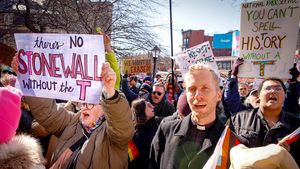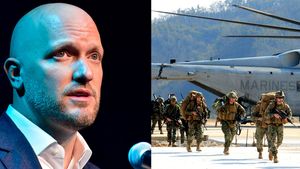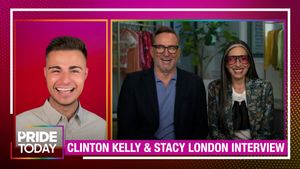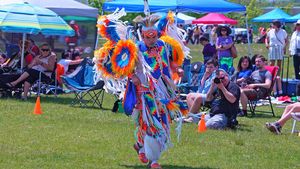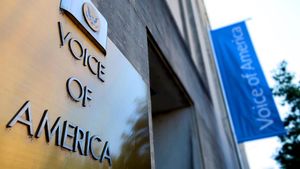Speaking out as a transgender person in this socio-political climate takes an immense amount of bravery; it takes even more when you're just a teenager. Michael Critchfield, a sophomore at Liberty High School in Clarksburg, West Virginia, alleges that on Nov. 27, assistant principal Lee Livengood harassed him while he was using a restroom on campus. At Liberty, the 15-year-old has been openly identifying as a trans boy for more than a year. While his experience hasn't always been smooth, this incident was the most egregious display of transphobia.
Last Monday, the American Civil Liberties Union of West Virginia (ACLU-WV), on behalf of the Critchfields, sent a letter to Harris County School District Superintendent Mark A. Manchin with three demands: implement the best practices when it comes to LGBTQ+ students, require training for teachers, administrators and staff at school to understand these issues better and pursue remedial discipline of Mr. Livengood appropriate for the incident.
While all parties await a resolution to this incident, OUT discussed the ordeal with Critchfield and his mother, Caroline, and what they hope other families can take away from their story.
Out: We're a few weeks out from when this incident happened. How are you feeling right now?
Michael Critchfield: Each day it gets a little bit easier to deal with, but it's still there and I still haven't processed the whole situation happening. It was a very traumatizing experience and it made me really anxious and frustrated.
Could you explain in your own words what that day was like and what transpired?
MC: We were waiting after school to go to a keynote concert for West Virginia University. [The chaperones] told us to use the bathroom before we get on the buses, so I went to the male restroom. I looked to see if there was anybody in the stalls, if there were I would have walked through with my head all the way down or waited until they came out. Both of the stalls were empty, so I went into one of the stalls and Mr. Livengood came in. Once I came out of the stall, I could see him blocking the door to get out of the restroom and he kept saying, 'Why are you in here? You shouldn't be in here,' and I kept saying, 'It is my legal right to be in here to use the bathroom.' Throughout the entire time [Lee Livengood] was yelling at me in the bathroom, I couldn't speak my piece.
When we came back from the band concert, I had to use the bathroom again, but I didn't want to go because I didn't want something like that to happen to me again. The feelings were still there and fresh from when they happened.
Was this the first time an incident like this -- targeting you as a trans student -- happened?
MC: I have been misgendered and deadnamed by teachers throughout the entire time I've been at Liberty, but this incident was the most traumatizing and hurt more than anything else that had happened to me at school.
Are there other openly queer and/or trans students at your school?
MC: There are a few, but I don't know if every single person in the school knows that they're trans. I know them personally and I know they are trans or gay or however they identify. I just don't want anyone to feel the way I felt when things happened to me -- or the way people can feel when others are rude to them because of their sexuality or gender identity.
Have you always been out since you've been at Liberty and how would you describe the atmosphere in terms of acceptance?
MC: I was out my freshman year during band camp, which happens before school starts. I had come out to everyone at band and sent notes to all of my teachers. My parents had met with the principals and all of the staff at school and told them that I was trans and that they supported me. They told them to use "Michael" and he/him pronouns. There's a lot of people who aren't straight or cis there. There's a lot of diversity there -- different people and different beliefs. There are always going to be people who aren't accepting and have their own beliefs, but before this incident they would usually keep them to themselves and wouldn't antagonize anyone. Maybe every now and then someone would do that, but most of time they were pretty accepting and supportive until this incident happened.
What has your support system been like at this time?
MC: My parents, family and some friends of mine have been supportive since the beginning -- before this incident -- and afterwards. The ACLU has been supportive of me as well.
Living in West Virginia, have you experienced harassment or mistreatment outside of school?
MC: When I go out places, people give me weird looks and look at me like I'm an alien and give me dirty looks and things, but no one has really come up to me and said anything outside of school.
Had you had previous interactions with Lee Livengood and how would you describe them?
MC: Not any talking for a long period of time. The only interaction I've had with him is getting my locker changed at the beginning of the year. And he is not my assistant principal, so he shouldn't have even said anything like that. He should have talked to my assistant principal.
Caroline Critchfield: He's a freshman assistant principal and Michael is a sophomore. Ms. Hawk is his assistant principal.
What do you want other young people to know about this incident?
MC: It can really hurt someone and mess with their emotions and mental state. No one should experience a situation like this no matter their identity. Schools should be safe environment for all students.
How do you think your school could prevent situations like this happening in the future?
MC: I think we should have a gay-straight alliance at our school, or a club. And people should trained on how to deal with a diverse population of people like those with different gender identities, sexualities and all differences.
Caroline, what was your reaction when you first heard what your son had experienced at school?
CC: I was so upset I told him I was so sorry I couldn't be there to protect him in that moment. How can someone who works in administration -- who's supposed to be an assistant principal and protect our children -- follow my son into the restroom and question him about what he's doing in there? How can he ask [Michael] if he tries hard enough he could use the urinal and tell him that he freaks him out? Who in their right mind would say something like that to a child? I still can't grip that in my mind. He should have never targeted my son.
Before this incident were you ever concerned that Michael could be harassed?
CC: Freshman year I was kind of concerned because he had just come out. That's why we as a family took it upon ourselves to go and talk to the administration. We wanted to make them aware that our son is transgender and he would prefer to be called by his name -- Michael -- and he would like the pronouns he, him, and his to be used.
Michael's therapist told him he should take the initiative to send a note to all of his teachers. We thought by telling them they would protect our son, but that's not what happened. The administration would always refer to him by his dead name. The students would look at him and laugh and make fun of him. I sent notes to them in the office and they still did it. This is definitely much worse than that. There were about two teachers out of about 12 in the last two years who were accepting.
How did you get in contact with the ACLU?
CC: I called the LGBTQ+ groups to find out who could help around town and there were some teachers who overheard the incident and told me to call the ACLU. They thought it was terrible the way he was treated.
What do you think other parents can do to make sure this doesn't happen to their children?
CC: I think other parents should take a stand, support their children, get involved with LGBTQ+ groups, ask their children if any incidents like this have happened to them and contact the ACLU so they can help. This has to stop. They have to understand that this is real and our children need to be treated with respect. If more parents can stand up for their children, I think more positive things can be done for the next generation.


















































